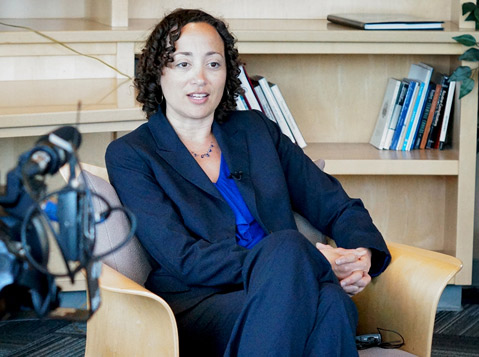Crime on Campus
Feds Shine Light on College Rapes

Sexual violence on college campuses jumped into the national spotlight last week as the executive office reminded Americans that the issue is an epidemic. The matter is two-tiered — prevention and response to assaults — and so prevalent that President Barack Obama and Vice President Joe Biden created a task force to protect students, which will mandate campus climate surveys, establish new policies that better embody victims’ rights, and create a multipurpose website — notalone.gov — to publicize information.
“Schools have a lot of work to do,” said Jill Dunlap, director of UCSB CARE (Campus Advocacy Resources and Education). “But it’s a task they are taking seriously and want to get right.” Last week, Dunlap arranged a visit from the person leading efforts at the national level. Catherine Lhamon, U.S. Department of Education assistant secretary for civil rights, is currently touring 14 universities, including UCSB, which received a $300,000 federal grant. The money funds a CARE full-time victims’ advocate, a half-time coordinator, and awareness campaigns.
What’s causing greater concern in higher education are accusations from students across the country that university administrators have swept sexual-assault cases under the rug. The feds promised to investigate 55 universities for alleged inadequate responses. To receive federal funding, universities must uphold Title IX, a law that prohibits gender discrimination and addresses ending rape and sexual harassment on campuses.
But the national discussion has questioned the extent to which universities are even equipped to handle serious criminal cases like sexual assault. “I think schools in general have hoped that they didn’t have to go there,” said District Attorney Joyce Dudley. “They need to get more training about violence in general, [including] sexual violence.”
At UCSB — which was not one of the 55 schools named — very few forcible rapes are noted each year in the campus’s security report, and recent Sheriff’s department reports show approximately 20 sexual assaults annually in Isla Vista. But last year, CARE saw 84 sexual assault cases, excluding stalking or domestic-violence incidents. Dunlap explained several reasons for this discrepancy: Her office is confidential, it includes incidents off campus, and there is often lag time in reporting.
Judicial Affairs sees more than 100 cases each year — ranging from academic issues like plagiarism to serious crimes like assault — and 16 involved sexual assault in 2012-2013, said Director Stephan Franklin. Judicial Affairs is staffed by seven employees and is intended to provide a “sub-criminal” option separate from the superior courts for students who choose not to go to the police.
Victims who report sexual assault to the university are not encouraged or discouraged from reporting the incident to the police. It is presented as a mid-range option to students, i.e., for those who do not want to go to law enforcement. (Judicial Affairs does not refer cases to the District Attorney’s Office). In her experience, Dunlap explained, students often opt to report to Judicial Affairs because it’s less intimidating than a formal court process and offers a variety of outcomes.
For UCSB senior Myra Crimmel, Judicial Affairs imposed its maximum punishment on the man she accused of raping her: He is suspended from school for two quarters and will be on probation when he returns to campus in the fall. But she argued the system is broken. “They just can’t deal with this level of crime,” asserted Crimmel, who sent a letter to UC President Janet Napolitano, arguing the process was delayed, lacked written documentation and transparency, and failed to offer legal guidance. Franklin said he couldn’t comment on individual proceedings, but UCSB spokesperson George Foulsham confirmed a UC Office of the President official will be reviewing the case.
In February, the issue of sexual assault received national attention at UCSB when a brutal gang rape shook the campus community. Chancellor Henry Yang promised five new officers and installed two large surveillance cameras near Isla Vista Theater. Take Back the Night rallied, and the news outlets spread the story. The survivor was the “perfect victim” — she didn’t know the perpetrators, called the police, and immediately provided evidence via a rape kit. But not all rape cases are quite as linear or generate as much attention. Throw in drugs, alcohol, and a party-culture reputation, and a seemingly black-and-white issue becomes gray. More than 40 percent of sexual assaults involve drugs and alcohol, and 85 percent involve people who know each other.
But activists contend alcohol and drugs should not dominate discussions. “Student party context should not be used to increase the burden of proof,” said UCSB English professor Chris Newfield. “The dialogue can begin to improve things. … The White House accelerated the process.”



